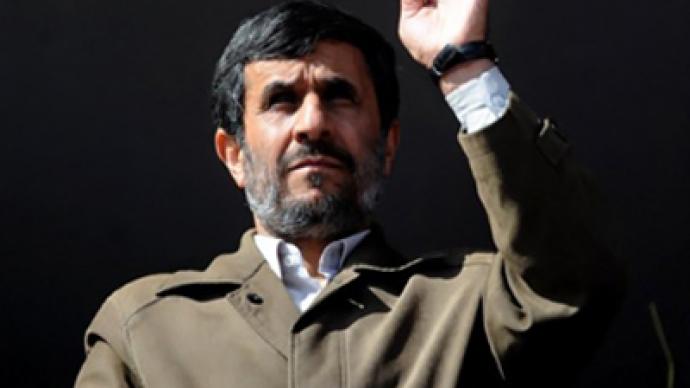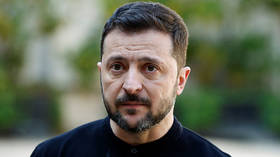Ahmadinejad slams Russia for selling out to “Satan”

With tensions rising over Iran’s nuclear program, the Iranian leader on Wednesday accused Russia of caving into US pressure by canceling a deal to supply S-300 ground-to-air missiles.
In September, Russian President Dmitry Medvedev signed an order banning the sale of the highly sophisticated S-300 missiles and other weapon systems to the Islamic republic.The contract, signed in 2005, is worth an estimated $800 million and obliged Russia to provide Iran with at least five S-300 systems. The Kremlin, however, decided against delivery of the weapon systems after the UN Security Council slapped further sanctions against Iran over its nuclear program.The Russian president’s decision to refuse Tehran the powerful weapon system had attracted no public reaction from the outspoken Iranian leader – until today."Some [Russia] who are under the influence of Satan [a reference to the United States] believe that if they unilaterally and illegally cancel some defense agreements that they have with us it will hurt the Iranian nation," Iranian President Mahmoud Ahmadinejad said in reference to the scrapped missile deal between Moscow and Tehran during a public rally in the northeastern city of Bojnourd.“They want to sell us off to our enemies and unilaterally breach a contract that they have been paid for. I want to tell them on your behalf that those contracts are still valid and must be executed or else the Iranian nation will retrieve its rights, its losses, as well as compensation fees," he told the cheering crowd.Ahmadinejad, however, says that Iran is capable of defending itself without the Russian missile systems."The Iranian nation will stand firm in the face of arrogance. The Iranian people do not need missiles to defend themselves."Tehran says it is developing a nuclear program as a means of creating energy for its civilian sector; other nations, specifically the United States and Israel, argue that Tehran is using the program as a cover for a nuclear weapons program.Israel, which has been on the receiving end of Ahmadinejad’s outbursts in the past, has said that “all options remain on the table” with regard to Iran and its fledgling nuclear program.In other words, Israel has not ruled out the use of military force, despite fierce international resistance to such an occurence.US President Barack Obama had promised in his campaign for the presidency to “sit down and talk” with hard-line leaders like Ahmadinejad, but those hopes never materialized once the Democrat got into the White House.Moscow supports new UN sanctions against Tehran, although it opposes any unilateral punitive measures.In October, Sergey Chemezov, chief of Russian Technology, said Russia would reimburse Iran for its down-payments on the advanced missiles.“We have annulled the contract and are returning the advance payment," Chemezov said, adding that the amount due to Tehran was $166.8 million (119.3 million euros).Still room for negotiations?In addition to his heated comments directed at Russia, the Iranian president warned that upcoming discussions with six world powers about its controversial nuclear program will fail if the West “continues the previous path of arrogance.”Ahmadinejad was referring to talks that Iran has said it is ready to hold with the US, Russia, China, Britain, France and Germany sometime after November 10.Iran's Supreme National Security Council, which handles the country's nuclear negotiations, and the European Union's foreign policy chief Catherine Ashton are said to be negotiating the date and place of the meeting.Meanwhile, Iran's Foreign Minister Manouchehr Mottaki is scheduled to travel to Georgia on November 3-4 to open an Iranian consular office in the Black Sea port of Batumi, as well as sign a visa-free travel agreement, Georgian media reported.Nino Kalandadze, the Georgian deputy foreign minister, said that both countries were interested in increasing bilateral trade and boosting tourism.“We are trying to reduce bureaucratic barriers and that’s the reason behind the visa-free travel agreement,” she told a news conference.Relations between Tbilisi and Moscow remain chilly following the outbreak of hostilities in August 2008, when Georgian forces launched a surprise attack against the South Ossetian capital of Tskhinval, which killed dozens of civilians, as well as Russian peacekeepers stationed in the area.Robert Bridge, RT













